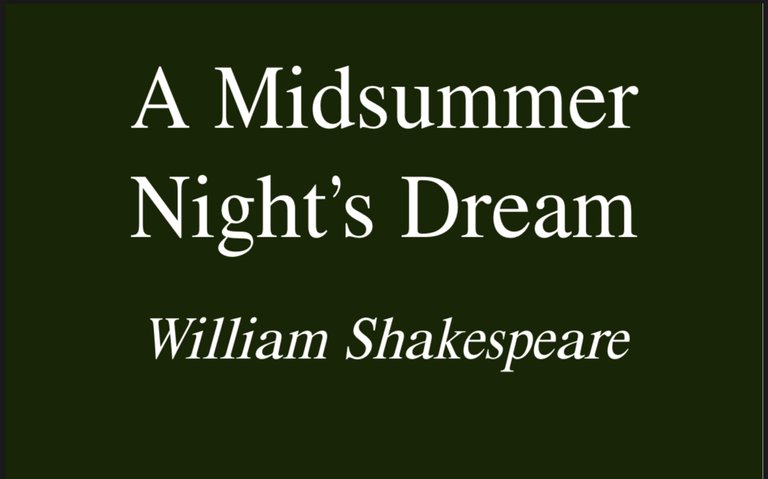
Image designed using Canva
William Shakespeare was an English poet, playwright, and actor. He is a pre-eminent writer. The meaning of pre-eminent is someone important in a particular field. In this context, William Shakespeare is regarded as one of the best, if not the best writers in the world of literature. He is globally known. I didn’t grow up reading his books, however, I fell in love with his works when I got to senior secondary school. His tragedies, comedies, and poems were part of the syllabus, so I had no other choice than to read and analyze them. Although William Shakespeare is dead (he died in 1616), his works are still surviving. His surviving works consist of 154 sonnets, 38 plays (including tragedies and comedies), and some other long narrative poems and works. One of William Shakespeare’s comedies is A Midsummer’s Night Dream. As I mentioned above, William Shakespeare is regarded as the most important English writer in history. His works are masterpieces, and this one is nothing less.

I’ve never disputed the fact that William Shakespeare is the most important English writer in history. While I appreciate William Shakespeare's contributions to literature, his works are not my go-to choice when I want to read a book. Instead, I prefer to re-read Judith Clarke's novels, which I find enjoyable. I read William Shakespeare's works for three main reasons: either an important person recommends it, I am looking to learn more about a specific historical period, or it is a required part of my school curriculum. As fate would have it, “A Midsummer’s Night Dream” is part of my school curriculum. I read the book last week, and in this post, I’ll do a book review of it.



A Midsummer’s Night Dream, a comedy by William Shakespeare, takes us on a profound exploration of love, magic, and the complex relationship that exists between humans. The exposition introduces six characters: Theseus (king of Athens), Hippolyta (his wife), Egeus, Hermia, Lysander, and Demetrius.
The backstory of the play which drives the narrative forward is introduced in the exposition: Lysander and Demetrius are both in love with Hermia, however, her father wants her to get married to Demetrius. In contrast to her father’s wish, Hermia is in love with Lysander and would love to get married to him. Egeus, comes to Theseus, the Duke of Athens, and tells him about the situation. He requests the Athenian law. The Athenian law which forces a woman to marry the man her father chooses or be executed or become a nun. Hermia stands her ground and still refuses.

Hermia plans to elope with the man of her heart, Lysander. They are followed by Helena and Demetrius. But their plan is sabotaged by Helena who tells Demetrius to gain his favour. I’m their quest to elope, they get lost in the forest where the fairies live. Oberon, the king of the fairies, sends Puck to play a trick on the four couples. Oberon’s instruction to Puck is to place a magical flower on Demetrius’s eyes, so he’d fall in love with her at first sight. However, due to mistaken identity, Puck confuses Lysander for Demetrius and makes him fall in love with Helena. This causes conflict between Hermia and Lysander.
Puck corrects his mistakes and revolves around the conflict. Lysander falls for Hermia, again and Demetrius falls in love with Helena. Egeseus, seeing that the couples are in love, allows them to get married to their lovers.


If there’s something I love about William Shakespeare’s works is that his plots are always captivating. He follows a chronological order without leaving anything out. The five scenes are well arranged. The narrative keeps the audience on their toes from the beginning to the end.
However, if you’re not well-focused, you might get lost in his work. One thing about William Shakespeare is that he uses Modern English, which was the form of the English language used from the late 15th to the late 17th century. Today, his type of English is outdated, making it very hard for readers to easily read and understand his works.

Also, this book is a comedy, but there are some elements of tragedy in it. I wouldn’t say it is a tragi-comedy. However, it contains a few elements of tragedies. For example the theme of unrequited love slightly drives it towards tragedy as a genre of drama.
In my opinion, this book gets a solid 7 out of 10. I recommend it to all book lovers.
Thanks for reading.